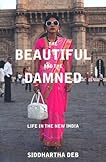 |
| What was Allied Carpets, a georgraphic landmark in Tottenham, destroyed |
I can't tell you how it feels to watch London implode from the distance (and sanctuary) of abroad. Not only my hometown but my home boroughs have been destroyed by the mindless thuggery initially fuelled by legitimate concerns. My daily London life stretches from Enfield in the north through Tottenham to Hackney and Tower Hamlets in the east. All have been the scene of senseless, destructive violence and looting.
But what I can tell you is that it’s been both interesting and sickening to watch how the news of the riots has been reported abroad, and how it’s been presented as a race war of unruly black youths – the implication being ‘immigrant’ youths – against the British authorities.
What is true is that there’s a real problem with urban youth. And ‘urban’ isn’t being used as a euphemism for ‘black’ as is so often the case. Inner city youths today have extremely limited ambitions. There’s an undeniable culture of low aspiration. Their whole world consists of the boundaries of their borough and, perhaps, slightly beyond. And, unfortunately, the opportunities that exist within that borough are often few and far between. So, they retreat into the community, speak in tongues using a bastardised street language that won’t help them get a job and withdraw into a world in which the only rule of law is that of the streets. They’ve taken the worst from rap music, upon which much blame has (somewhat rightly) been heaped, while ignoring the message that rappers always aspired to transcend their circumstances through their music not stay in them. Add to this the chasm that exists between the politicians and the people and you have an incendiary situation, the flames of which will be fanned indefinitely if serious measures to extinguish them aren’t taken.
The political divide
People don't trust politicians. And no one has trusted this Coalition since it was hastily cobbled together just over a year ago. Three days of rioting highlight what’s long been obvious. MPs are nowhere to be seen in the darkness of night but are all over the place when the illumination of flashbulbs and television cameras appear: holding brooms aloft in Clapham to be seen to lead the clean-up charge, showing solidarity with the police whose salaries and numbers they’re irrationally cutting and fronting press conferences where more questions are asked than are ever answered. Outside of these photo opps, these politicians are invisible in the communities they’re supposed to be serving.
When I was growing up, our local MP, Rhodes Boyson, a Conservative (Brent North), knew every family on our street by name. We’d regularly see him in the local community (not just at election time) and he’d stop and greet us and chat and it was all very cordial and genuine. Even the neighbouring MPs - at the time Ken Livingstone (Brent East) and Paul Boateng (Brent South) - were always around, on the ground, highly visible and ready to talk to the people they represented.
But when was the last time Boris Johnson, David Cameron or Theresa May was seen walking the streets of Tottenham, talking to people and listening to their opinions, gauging their concerns?
This week, I heard that a friend was on the train with David Lammy, the MP for Tottenham. She asked him to talk to a young man she was mentoring, who was also on the train and slightly in awe of the MP. She said he declined.
The BBC reported a Hackney resident as saying: "When you've got bankers taking their bonuses and MP's taking money off people like me for their moats, and their chateaus and their castles, this is the result." This is no excuse for criminal behaviour. But the gulf between politicians and the people has become almost unbreachable.
They just don’t get it
Hearing politicians pontificating on TV saying that parents should know where their kids are and get them off the street shows just how out of touch they are. The parents already know where the kids are because they're looting the city with their kids. The parents are part of the problem, not the immediate solution. Worklessness is endemic in parts of London. Generational joblessness has been bequeathed from father to son and mother to daughter. By calling on parents to get their kids off the streets reveals massive ignorance on the politicians’ part.
A classic example of the lax parenting that exists in some communities is this: One day, while walking through Edmonton, a young (white) mother was out with her two infant children, one in a pram and the other, a toddler, walking beside her. Out of nowhere, this woman launched into a foul-mouthed tirade against the elder child saying: ‘Come here you f*&!ng c@nt. I told you to stay near me, you b@st@rd!’ Her son was no more than four years old. What hope for that child?
The failure of regeneration
Millions of pounds have been poured into regenerating poor communities in the hope that economic investment will produce a human capital return. But when the majority of the investment is in the form of Bettfreds, Ladbrokes and knock-off KFC chicken-and-chip shops the prospects for urban renewal aren’t quite as good as the multimillion budgets and fancy architectural designs make out. Since leaving Edmonton twelve months ago, I’ve noticed over time the complete decimation of the high street. Where once shops competed for business, they now sit empty. And instead of using the vacant space for community projects at a time when libraries across the borough are being shut down, the empty shops serve to remind the community that they’re not worth investing in. When even the pound shops won’t come, you know you that the powers-that-be see people like you as ten-a-penny, worthless.
The class war
I think there is an anti-intellectualism movement in the working class youth of today and this audio is an example of it. Rather than have aspirations to improve oneself through education or work, they aspire to destroy others and bring others to their level. It’s a combination of entitlement and jealousy. There is no connection between work ethic and success - they believe everyone has inherited wealth, rather than worked for it. It's probably New Labour’s fault. Bad schooling, lack of discipline, lowering of academic expectations, materialism etc.
Also, imagine the parents of these girls and what they must have learnt from them. The parents are probably giving them a negative message e.g. they think they're poor because of society, and not because of a lack of discipline/education/manners/class etc. So rather than teaching them to have ambition, they say "this is your lot, live with it". So the kids riot because they think they have nothing to lose.
I would say these girls are quite typical of low income youth in this country. So many of these kids don't have life/work skills by the time they are 18 they are worthless to society, so society is worthless to them.
 |
| A woman leaps from a burning building into the arms of police officers in Surrey Street, Croydon. Photograph: Amy Weston/WENN.com |
Ed said it best
On a visit to Peckham, Labour leader Ed Miliband said what the government is afraid to admit. "The issue of deeper underlying causes of some of the activity that we have seen, of why people indulge in this criminal behaviour, is something that, of course, needs to be looked at," he says. "We need to look at issues of parenting, issues of aspiration, issues of prospects for people, but there can never be any excuse for the kinds of things we have seen."
There is no excuse for the wanton violence on the streets of the great city that is London, my home. But politicians must recognise their role in creating the conditions for mayhem if not the mayhem itself. It’s not just the cuts. It’s the rhetoric. Multiculturalism hasn't failed. This is nothing to do with multiculturalism and everything to do with opportunistic criminality and class. To deny that would be to deny the fundamental facts at work. And that, too, would be criminal.
Watch the clip below for a more eloquent voice of reason.
 Beautiful Thing: Inside the Secret World of Bombay's Dance Bars by Sonia Faleiro
Beautiful Thing: Inside the Secret World of Bombay's Dance Bars by Sonia Faleiro














